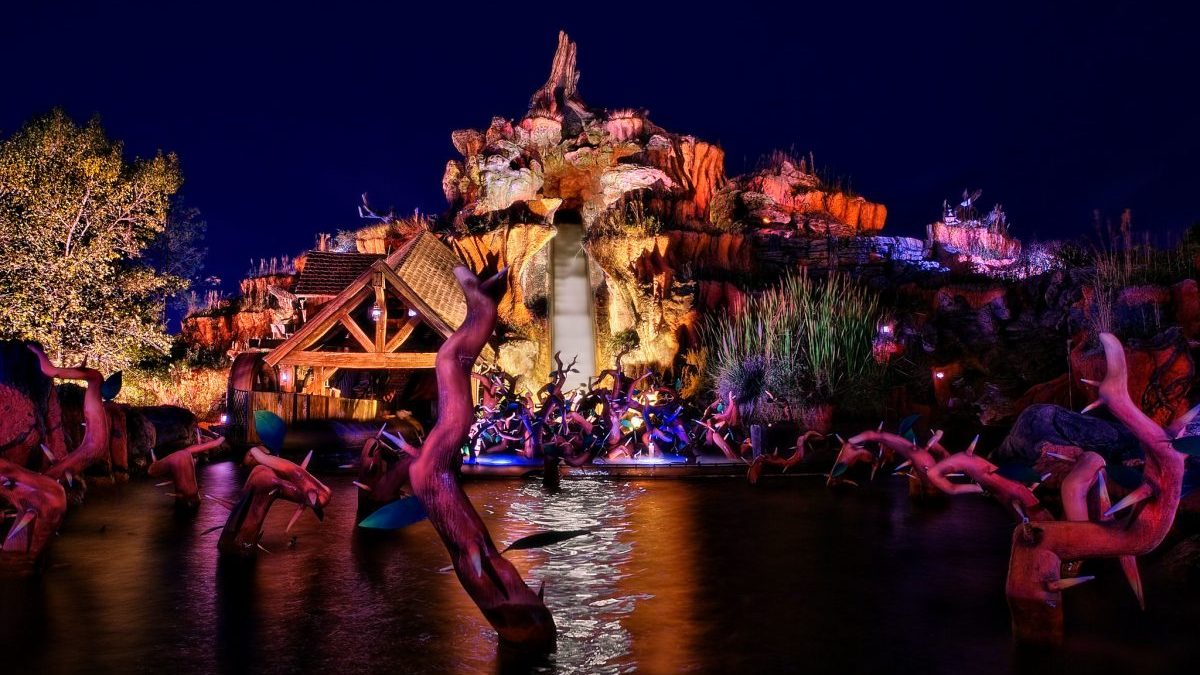The news that the American Disney parks would replace their Splash Mountain ride with a new The Princess and the Frog attraction called Tiana’s Bayou Adventure sparked plenty of discussion on social media. The main reason for this change is that Splash Mountain is themed around and uses characters from Disney’s most infamous movie, Song Of The South.
But what is this film, and why is it so controversial?
Why is Song of the South controversial?
Song of the South is one of the few movies you’ll never see on Disney Plus. In fact, the movie has never had a home video release in America due to how controversial it is.
First released in 1946, Song of the South is set on a plantation in Reconstruction Era Georgia. It follows Johnny, a young boy who is sent to live on his grandparents’ plantation when his parents separate for a while. This upsets the boy, and one night he decides to try and run away. During this escape attempt, Johnny sees Uncle Remus telling folk tales to the sharecroppers. Remus takes Johnny in and tells him a folk tale about the crafty Br’er Rabbit before convincing the boy to not run away.
Soon, Johnny befriends two other children who live near the plantation, Toby and Ginny Favers, and all three go on adventures, frequently learning from Uncle Remus and his tales of Br’er Rabbit. The film fuses live-action and animation as Uncle Remus, Johnny, and the other human characters are live-action while Br’er Rabbit and his friends are animated, making this film a landmark in animation history.
The first controversy associated with this film is its source material. The character of Uncle Remus was created by author Joel Chandler Harris in 1876. Using this character, Harris published many different folk tales featuring Br’er Rabbit, many of which Harris said he learned from the enslaved people who lived on the Turnwold Plantation, a place Harris lived as a young boy. This means that Harris took these people’s folk tales, packaged them up, and made a living off them, despite these stories not belonging to him. In addition, Harris wrote Remus’ dialogue in a stereotypical way in a poor attempt to imitate the local African-American accent and dialect, making it read like a racist parody today.
The film does nothing to remove the offensive elements from Harris’ stories, nor does it make any attempt to handle the cultural appropriation of these original folk tales. When Song of the South was released, it sparked controversy, and many groups voiced their frustrations, arguing that the film whitewashed the Reconstruction Era and harked back to a pre-Civil War past that never was. This included the NAACP, who complained about “the impression it gives of an idyllic master-slave relationship, which is a distortion of the facts.”
However, Song of the South did also receive praise from critics, even winning several awards. At the 1948 Academy Awards, Song of the South won Best Original Song for “Zip-a-Dee-Doo-Dah,” and the actor who played Uncle Remus, James Baskett, was given a special Academy Award. This award made Baskett the first African-American man to win an Oscar. But, as segregation was still rife, Baskett hadn’t been allowed to attend the film’s opening in Atlanta, a perfect symbol of the cultural appropriation sitting at the heart of Song of the South.
This didn’t stop Disney from re-releasing the film several times. The movie returned to cinemas in 1956, 1972, 1973, 1980, and 1986. Though with every re-release, protests about the film became louder, with more and more people understanding how offensive the movie was. Today, Disney does not reference the film directly and at the 2010 shareholder meeting, then-CEO Bob Iger described the movie as “antiquated” and “fairly offensive,” before noting that Disney had no plans to issue the film on home media.
In 1983, the then-president of Walt Disney attractions, Dick Nunis, wanted to include a log flume in the theme parks. Realizing that Disney had a load of animal animatronics left from the recently closed America Sings attraction, Imagineer Tony Baxter was reminded of Song of the South and designed the ride we know today. The ride was going to be called Zip-a-Dee River Run until CEO Michael Eisner stepped in and changed the name, hoping it could also be used to promote Disney’s then-upcoming live-action movie Splash.
Even when designing the ride, Disney understood that Song of the South was controversial. But people in the company told the Los Angeles Times that “they do not expect the ride to provoke criticism because it uses only the animated animal characters.” However, even without including content from the live-action parts, the ride is still based on stolen folk tales and linked to a racist movie.
What will happen to Splash Mountain?
In 2020, Disney announced that both American Splash Mountain rides would be closing. These attractions would be transformed into Tiana’s Bayou Adventure, a new ride featuring characters from Disney’s beloved The Princess and the Frog movie. These characters, especially Princess Tiana, have become some of the most beloved Disney characters of the modern age, with Tiana set to receive her own Disney Plus show in the near future.
Hopefully, Disney can create a ride that pleases thrill-ride fans and people who love The Princess and the Frog while also avoiding the problem Funko has recently had, resulting in an attraction that brings the on-screen characters to life in a fun, memorable, and respectful way.

